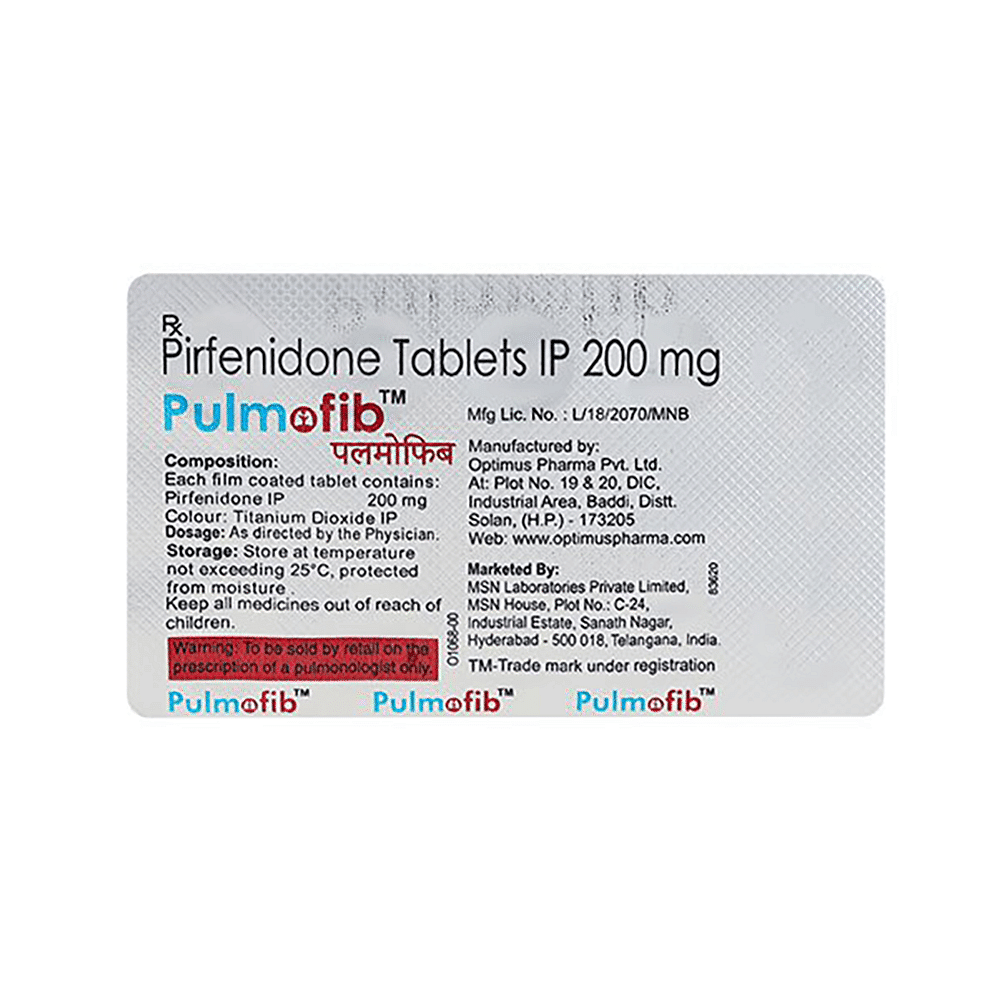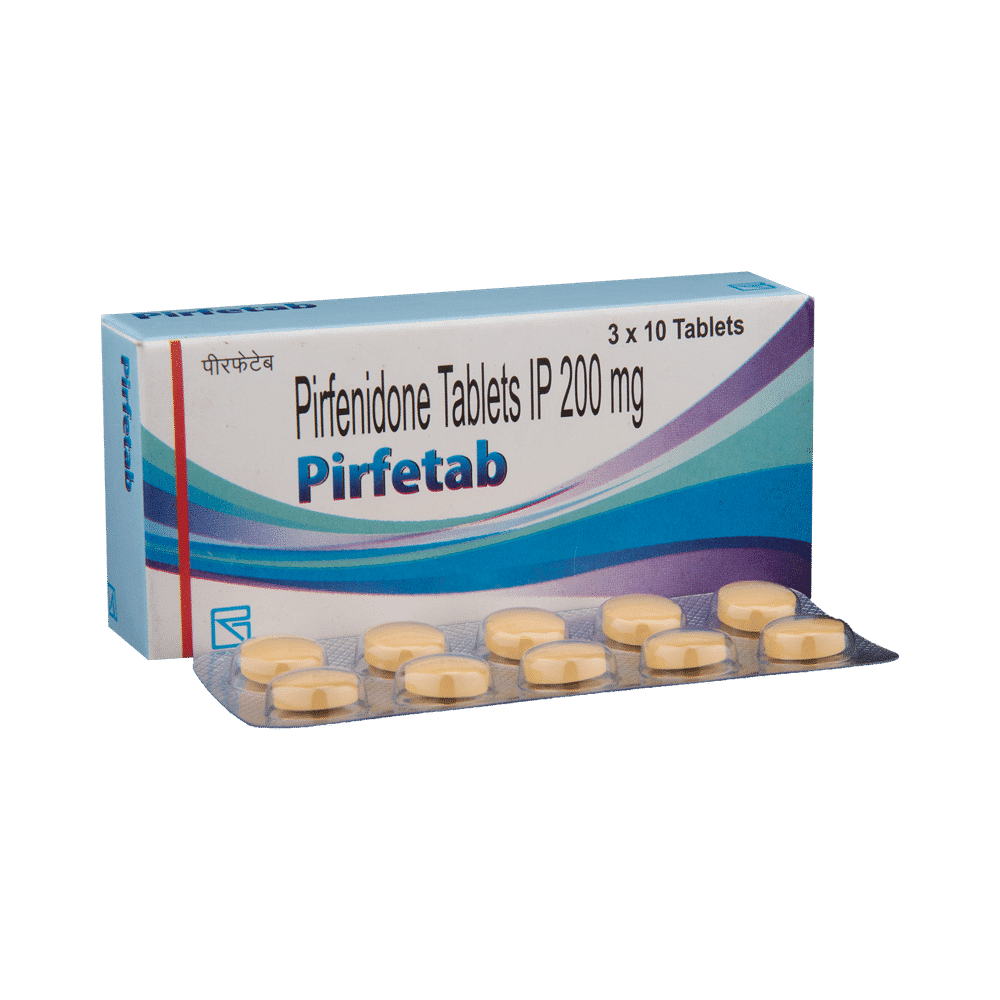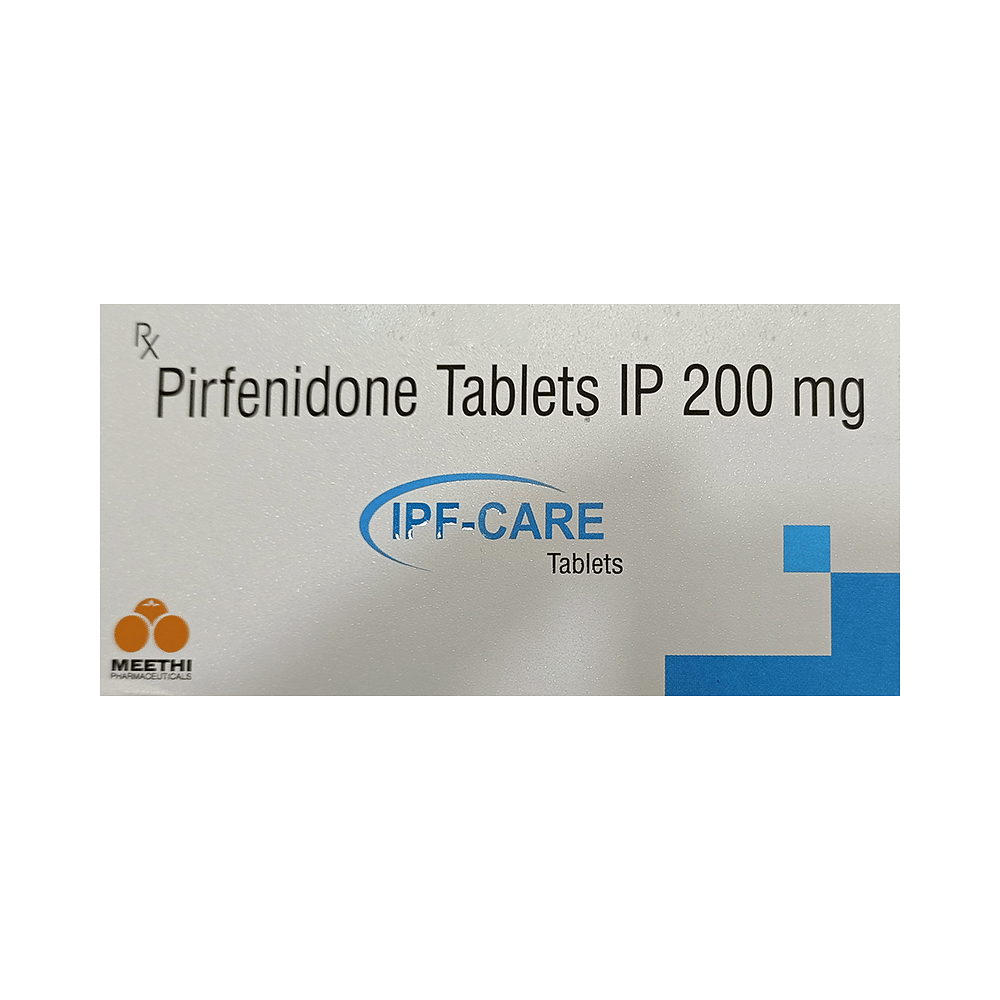
Pirfeza 200mg Tablet
Manufacturer
Uniza Healthcare LLP
Salt Composition
Pirfenidone (200mg)
Key Information
Short Description
Pirfeza 200mg Tablet is a prescription medicine used in the treatment of idiopathic pulmonary fibrosis. It reduces scarring and swelling in the lungs and helps to breathe better.
Dosage Form
Tablet
Introduction
Pirfeza 200mg Tablet is best taken with food. Take it at the same time every day to get the most benefits. The dose and how often you take it depends on what you are taking it for. Your doctor will decide how much you need to improve your symptoms. You should take this medicine for as long as it is prescribed for you. The most common side effects of this medicine include insomnia, headache, dizziness, dyspepsia, nausea, diarrhea, and photosensitivity. To overcome dizziness, avoid driving or attention-seeking activity. Some people may experience weight loss and other side effects. Monitor your weight regularly or ask for the doctor's advice in such cases. Your doctor also may perform a liver function test while on treatment with this medicine.
Directions for Use
Take this medicine in the dose and duration as advised by your doctor. Swallow it as a whole. Do not chew, crush or break it. Pirfeza 200mg Tablet is to be taken with food.
How it works
Pirfeza 200mg Tablet is an antifibrotic medication. It works by blocking the action of a certain natural substance in the body that is involved in causing fibrosis. This reduces the scarring and swelling in the lungs and makes breathing easier.
Quick Tips
Pirfeza 200mg Tablet reduces scarring and swelling in the lungs and helps you breathe better. It is best to take this medicine with food and at the same time each day. This medication may make you more sensitive to sun. Use sunscreen and wear protective clothing when outdoors. Stop smoking during treatment with Pirfeza 200mg Tablet as it can reduce the effect of the treatment. It may cause dizziness or sleepiness. Do not drive or do anything requiring concentration until you know how it affects you. It may cause weight loss. Monitor your weight regularly. Your doctor may check your liver function regularly. Inform your doctor if you develop abdominal pain, loss of appetite, darkened urine or yellowing of the eyes or skin (jaundice).
Related Medicines

Pulmofib 200mg Tablet

Pirfetab Tablet

Pirvac 200mg Tablet

Spiropirf Tablet

Pirfetid 200mg Tablet

Pirtenext 200mg Tablet

Ipf-Care Tablet

Pirfenol 200mg Tablet

Vaidifine 200mg Tablet

Pirmax 200 Tablet
Frequently asked questions
What monitoring will I need during treatment with Pirfeza 200mg Tablet?
Regular liver function tests are necessary before starting treatment and periodically thereafter. Additionally, your doctor will monitor your lung function to assess the response to this medication.
Why is it essential to continue treatment with Pirfeza 200mg Tablet?
Continuing treatment can help preserve existing lung function, which cannot be restored once lost. It is crucial to control disease progression and manage symptoms effectively.
What are the common side effects of Pirfeza 200mg Tablet?
Side effects may include skin sensitivity to sunlight, nausea, fatigue, diarrhea, indigestion, loss of appetite, headache, throat or airway infections, bladder infections, weight loss, difficulty sleeping, dizziness, sleepiness, changes in taste, hot flushes, shortness of breath, and cough. Other side effects can involve stomach issues such as acid reflux, vomiting, bloating, abdominal pain and discomfort, heartburn, constipation, skin problems like itchy skin, red skin, dry skin, skin rash, muscle pain, aching joints/joint pains, weakness, chest pain, and sunburn.
Is Pirfeza 200mg Tablet classified as a steroid?
No, this medication belongs to the pyridines group of medicines and is not a steroid. It is used to treat idiopathic pulmonary fibrosis (IPF) in adults by reducing lung scarring and promoting better breathing.
How do I determine if Pirfeza 200mg Tablet is right for me?
Only your doctor can decide, after assessing your condition. They will prescribe the medication based on your response to treatment and tolerance.
If my disease is stable, can I stop taking Pirfeza 200mg Tablet?
Idiopathic pulmonary fibrosis is a progressive disease with unpredictable progression. Do not stop taking this medication without consulting your doctor. Continue treatment to slow down disease progression.
What should I avoid while taking Pirfeza 200mg Tablet?
Restrict sun exposure, wear sunblock daily, and cover arms, legs, and head to reduce sunlight exposure. Avoid smoking as it can decrease the effectiveness of this medication.
What is the survival rate for pulmonary fibrosis patients?
The median survival time for pulmonary fibrosis patients is 2-3 years, but some individuals may live longer. Survival rates are influenced by factors such as age, smoking history, body mass index, and disease severity.


